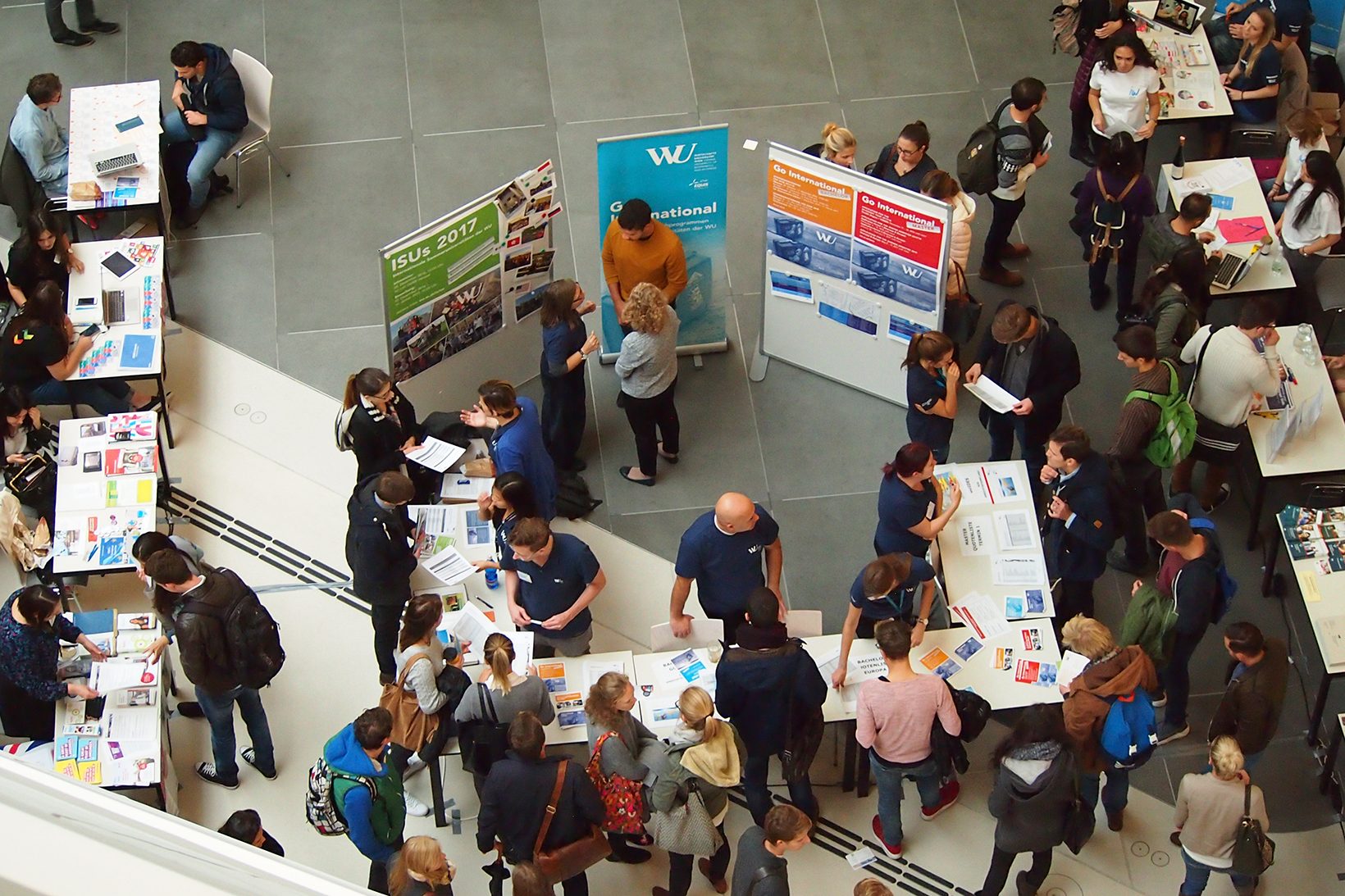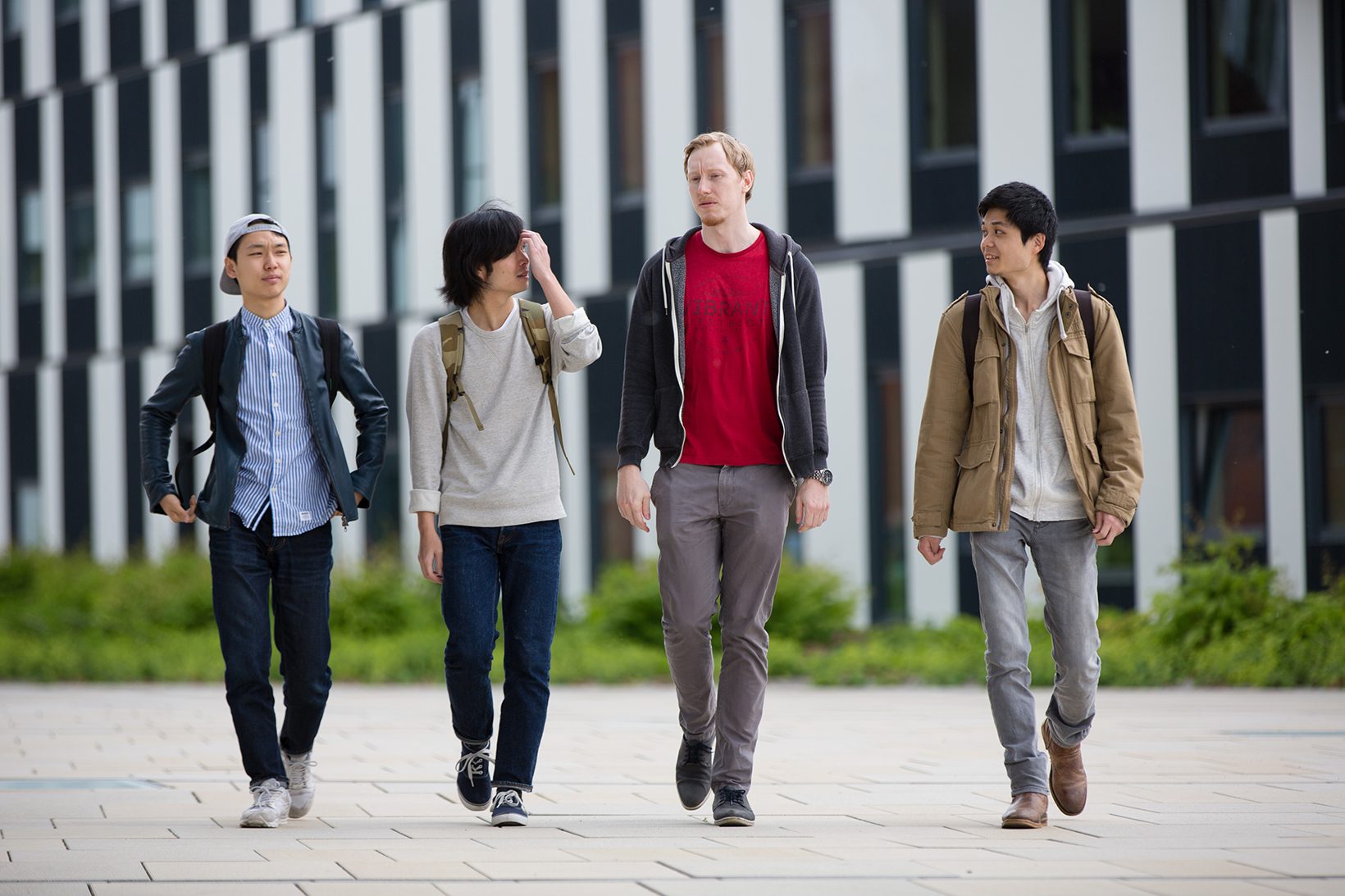Where should I go? Which partner school offers courses I can benefit from the most? Can I get credit for courses I take at a partner university? These and more are the questions students have before organizing an exchange semester abroad. To help them get the most out of their exchange experience, WU is constantly expanding its advisory and information services.
At the 2017 Go Global Fair, 150 WU students, both guest students from international partner schools and WU students with international experience, staffed 85 booths to let students interested in going abroad profit from their experience. External organizations like the Students’ Union (ÖH) Erasmus Buddy Network, AIESEC, Housing Anywhere, Campus France, the British Council, and the US Embassy were on hand to provide valuable information. To round out the program, Wolfgang Obenaus (Dean for International Affairs) and Barbara Moser (WU ZBP Career Center) gave talks on the selection process and on composing the perfect motivation letter.

After finding out more about international exchange in general, the next step is choosing a partner school. But how much are courses at a particular school worth towards a WU degree program? In the EU, the answer is easy: One ECTS credit at a partner school is worth one ECTS credit at WU, of course. The issue is a bit more complicated for schools outside the European Union. To help students plan an exchange outside the EU, the International Office and the Study Regulations and Credit Transfer Office have developed an online credit transfer database. It has been available to students since the summer of 2017, and lets students know which courses can be transferred to their WU program and for how many ECTS credits, and how to convert grades from different grading systems to the Austrian numerical grading system.
Financial Obstacles? No, Thanks!
What can students do if it looks like they won’t be able to afford to go on exchange? Scholarships and mobility grants are there to help.
Erasmus+
Erasmus+, the European Union program for education and vocational training, celebrated its 30th anniversary in 2017. In these three decades, some 5,500 WU students and 217 WU faculty members received mobility grants to work or study abroad, and 5,600 students from EU partner universities came to WU on exchange.
To celebrate this anniversary, on May 10, an Erasmus+ Day was held all over Austria to inform students about the program.
Erasmus+ International Credit Mobility
The Erasmus+ International Credit Mobility (ICM) program provides financial aid for stays at universities outside Europe. In the 2016/17 academic year, 14 people were awarded grants from this program, allowing them to study at renowned universities on five continents.
Exchange students visited the following universities on ICM grants in 2016/17:
- University of Technology Sydney
- University of Sarajevo
- Queen’s University
- Tsinghua University
- Hong Kong Polytechnic University
- Universitas Gadjah Mada
- Tel Aviv University
- St. Petersburg University
- Thammasat University
- Vadym Hetman Kyiv National Economic University
- University of Illinois at Urbana-Champaign
- Hanoi University of Science and Technology
- University of Economics Ho Chi Minh City
- Stellenbosch University
- University of Belgrade

Joint Study
Joint Study is WU’s second-largest mobility program. All WU students nominated for an exchange semester at a partner school in Africa, America, Asia, Australia, New Zealand, Russia, Ukraine, or Serbia are eligible to apply for a Joint Study grant. A total of 459 Joint Study grants were awarded in the 2016/17 academic year. This program is financed from WU’s own budget.
ISU scholarships
Short programs are not eligible for Erasmus grants or state-funded scholarships, even though their brief duration makes programs like the International Summer University (ISU) especially attractive for students who can’t or don’t want to spend a longer time abroad. To allow even socially disadvantaged students to participate, WU introduced scholarships for the International Summer University programs in Estonia, Indonesia, Thailand, Hong Kong, and Russia in 2017. In the first year, seven students were awarded ISU scholarships.

Welcome Back!
The International Office now also offers support for returning exchange students: The new “Welcome Back!” program was launched in May of 2017. Returning exchange students meet in small groups to go over all the administrative steps necessary after completing their stay abroad. Participants also give feedback about the host schools they visited and have the opportunity to reflect on the benefits of their exchange experience with fellow students.

